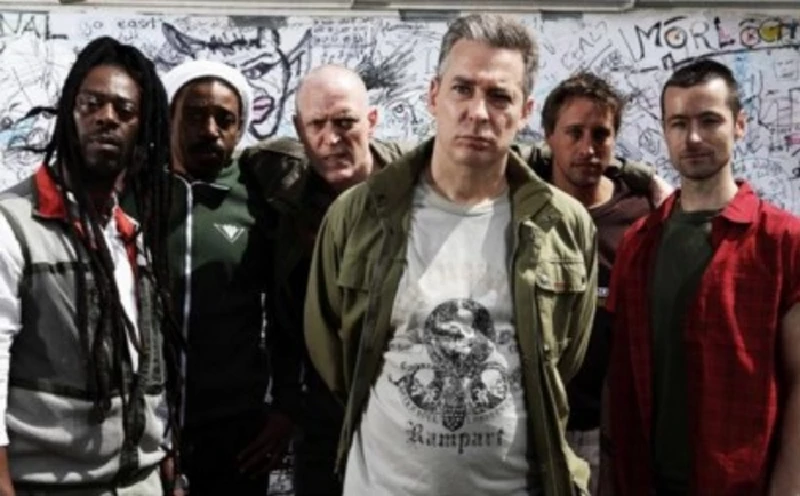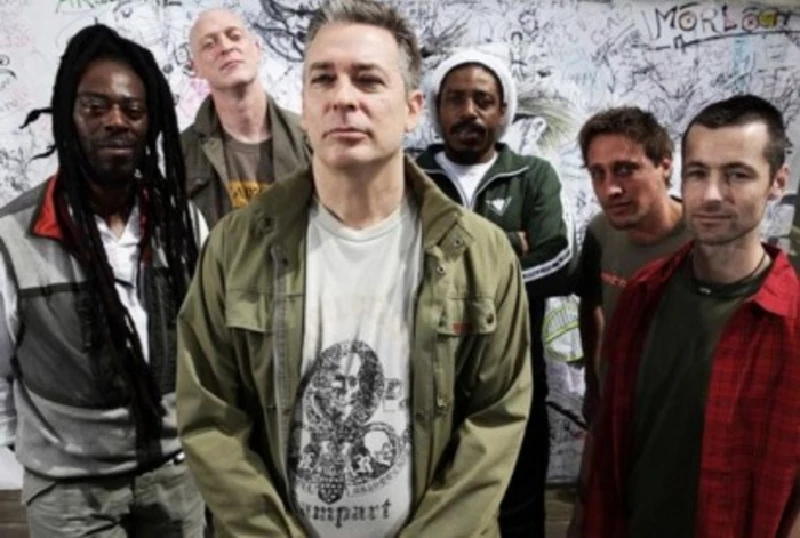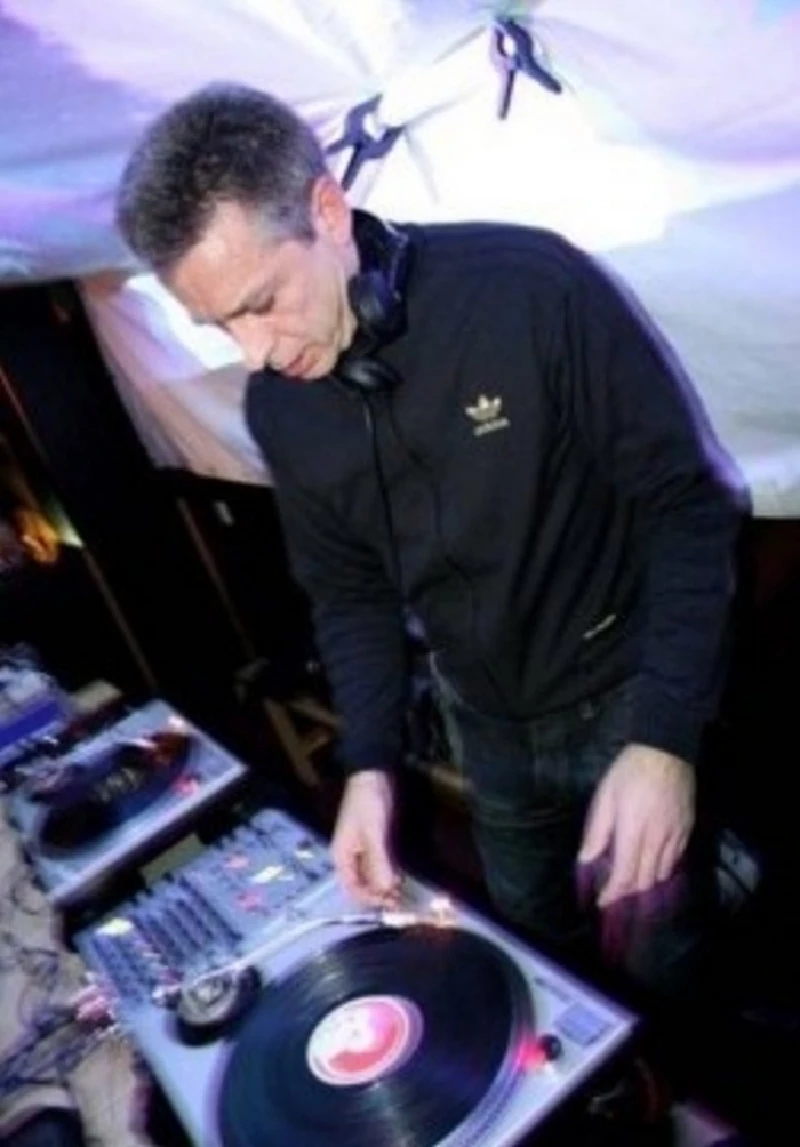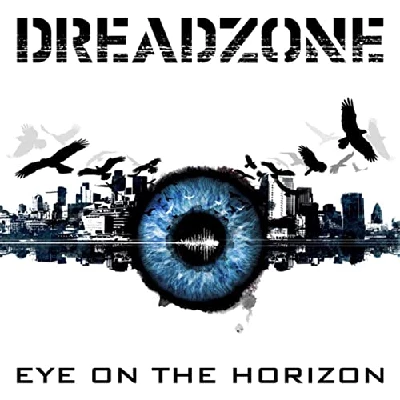Dreadzone - Interview
by John Clarkson
published: 1 / 12 / 2009

intro
John Clarkson talks to Greg Roberts, the front man with dub/reggae/techno group Dreadzone, about his development as a songwriter since his first group Big Audio Dynamite and Dreadzone’s forthcoming new album, ‘Eye on the Horizon’
Dreadzone’s music is an eclectic melange of dub, reggae, techno, trance and folk. First formed in 1992, Dreadzone are centred around drummer and keyboardist and founding member Greg Roberts, and have to date released six albums, ’360°’ (1993), ‘Second Light’ (1995, which was listed by John Peel as being one on his ten favourite albums of all time), ‘Biological Radio’ (1997), ‘Sound’ (2001), ‘Once Upon a Time’(2005) and ‘Live at Sunrise’ (2006). Roberts, or Greg Dread as he is also known, was previously the drummer in the original line-up of Big Audio Dynamite (BAD), the band led by ex- Clash guitarist Mick Jones, and was also in its successor Screaming Target, a short-lived reggae group, which was fronted by BAD keyboardist,Don Letts. He appeared on Big Audio Dynamite’s first four albums, ‘This is Big Audio Dynamite’ (1985), ‘Number 10 Upping Street’ (1986), ‘Tighten Up Vol. 1988’ (1988) and ‘Megatop Phoenix’ (1989), and also played on Screaming Target’s ‘ solitary LP, ‘Hometown Hi-Fi’ (1991). The other consistent link in Dreadzone has been bassist Leo Williams, who was again a member of Big Audio Dynamite and Screaming Target. Dreadzone have been through various permutations. BAD keyboardist Dan Donovan was an early member, and the group, as well as Roberts and Williams, also currently consists of reggae vocalist Earl 16, MC Spee and new recruits Chris Compton on guitar and Chris Oldfield on technology. They have made regular and riveting use of both music and film samples in their music, a technique Roberts first learnt during his tenure in Big Audio Dynamite. Past records have seen Dreadzone sampling from composers and musicians as varied as Vaughan Williams, Purcell, Ennio Morricone, Ryuichi Sakamoto, Big Youth, Yello and Enigma. Roberts and his band mates have also used dialogue from films including ‘If’ (on their 1995 Top 20 hit ‘Little Britain’), ‘Gremlins’, ‘2001: A Space Odyssey’, ‘Picnic at Hanging Rock’, ‘Monty Python and the Holy Grail’ and ‘Far from the Madding Crowd’. Dreadzone released a single, ‘Beyond the Rock’, in the summer, which showed a harder rock edge than they have revealed in the past. They also put a download only free single, ‘Tomorrow Never Comes’, in October. While their music was initially predominantly instrumental, they have in recent years become more lyric-based. They have spent much of the last year touring. Greg Roberts spoke to Pennyblackmusic about his progress and growth as a songwriter since Big Audio Dynamite and Dreadzone’s forthcoming new album, ‘Eye on the Horizon’, which will be released in March. PB : You spent the summer playing festivals across Europe and are now coming towards the end of a UK tour. You’ve on this tour been playing to club numbers of about 500 people, while on the festivals you have been playing to audiences of anything up to 19,000. Which do you enjoy playing more and why? GR: They are both equally rewarding. I love playing festivals, but you have to be prepared to jump up there and play your set fairly quickly and with very little preparation when it comes to checking the sound. It is a lot of fun playing to big crowds and winning people over at festivals. I enjoy the intimacy of playing to our own crowds too though. You get the chance to sound check and to play a much longer set. You are able to try out new stuff. You do encores. Everybody is up close. I can’t really choose one over the other. I have never been able to. It is like that age old question. What do you like best? Playing live or making music in the studio? Each has their own qualities. PB: You have added two new members to the line-up in recent years, Chris Compton and Chris Oldfield. What do you think they have brought to the band? GR: Chris Compton has brought in a unique guitar sound, which has opened the band out into new areas. There are a couple of tunes on the new album which are quite rocky and that is down to him. He has also got a very good melodic sense. Chris Oldfield hasn’t brought in anything especially musically. He comes from a lighting and production background. He operates and runs the technology on stage. Having two new people has brought in a new energy which is always very good. We’re a really tight unit at the moment. PB: Your recent single, ‘Beyond the Rock’, in particular has more of a rock edge than other Dreadzone tracks. Do you see it in some ways as being a return to the values of Big Audio Dynamite? GR: I think so. Yeah. It is a nod to Big Audio Dynamite and to our rock background. As we’ve got a new guitarist in the band, we thought let’s use him. Let’s crank him up. Rock ‘n’ roll is in our DNA. We came out of Big Audio Dynamite and we should reflect that. That tune started out with an African kind of groove that we had. I built a rhythm on top of it and we had a rough outline for it, but then, when Chris came in with that guitar line, a vocal also sprang out of it and it just seemed like the natural way to go. When people started going, “Oh, that’s not very dub, is it?”, I realised that we had confused some of our fans with it. To me it is just a song that we have written and it just happens to be of that genre. I wouldn’t, however, have wanted Chris to just come in and do a few skanks here and there. He is, like I say, a very melodic guitarist and I think we have utilised that there. I am very proud of ‘Beyond the Rock’ and I think that it will stand the test of time. It has got a classic feel and a really great groove. It reflects the live band really well and I like the fact that we dropped that in there and it has confounded a few people. It has, however, made us a lot of new fans as well. I have noticed that we have had a lot of younger fans coming to see us on this tour and they have really picked up on that tune. PB: ‘Beyond the Rock’ is quite a natural development really for you, isn’t it? You have always mixed up genres and fused things anyway. GR: I don’t think we don’t do anything which isn’t natural to us. As you say, it is hearkening back to the Big Audio Dynamite thing. For me personally as a writer and a musician my first love in music was the Who. That was the first band that I really latched onto. I think they are a brilliant group and they’re a part of my history. It is a reflection on that too. PB: Obviously instrumentation is still really important with Dreadzone, but you seem to be much more lyrically based these days as well. GR: Very much so. On ‘Eye on the Horizon’ there are actually ten songs. There were going to be eleven tunes and one of them was an instrumental, but we have actually taken that off as we didn’t think that it fitted in with the concept of the rest of the album. It is going to be a bonus track with the iTunes release instead. We have got ten fully fledged songs this time with verses and choruses and even middle eights. I have always loved good songs. They are something that you remember ten, twenty years later. You remember the song. You don’t remember the beat. I like to think that we are developing as songwriters and this album is a measure of that. PB: Your very first song writing credit on an album came with ‘Ticket’ on Big Audio Dynamite’s second album, ‘No 10 Upping Street’. Had you been in other bands before that? GR: No. Big Audio Dynamite was my transition. It was my learning curve. I have always said that. I joined as a drummer, but when I finally got the job as the drummer Mick Jones thrust a drum machine at me and said, “Look! Make that work. I don’t know how you are going to do it, but make that work for you.” I did. Leo and I started playing along with it. It is our 25th anniversary of playing together this year. During that time we have always worked with machines. It was having that drum machine which opened up to me a whole new world with technology. From the drum machine I discovered the sampler and then the sequencer and then by the time I left Big Audio Dynamite I wasn’t just a drummer. I was a drummer who could write his own music, who could put his own grooves together and sample things. I could write actual backing tracks. I could put a sample and the keyboards and a drum track together. Then all we needed was Leo’s bass and a bit of vocal and we were away. The full formation of that was the beginning of Dreadzone. PB: Does the song writing in Dreadzone work in a different way to what went on in Big Audio Dynamite? GR: The song writing has always varied. I wrote maybe eighty percent of the first Dreadzone album and I also did the bulk of the song writing on ‘Second Light’. On the later Dreadzone albums, I have, however, stood back and tried to involve everybody a lot more. With ‘Eye on the Horizon’, it is all very inclusive. There is some stuff that I have written on my own, but we’re not looking at it like that. We’ve all contributed to it in some way or another and all made this album come to life, so we have decided to adopt the U2 model of splitting the song writing credits equally down the middle. It can get a bit difficult if you start going, “Well, I did this bit and I did that bit.” At the end of the day we just wanted to get the best possible album made. Big Audio Dynamite was driven by Mick Jones and his ideas. Even though we all contributed, Don Letts was the biggest writer in Big Audio Dynamite after Mick because he contributed a lot of the lyrics. What we had there was some kind of benign dictatorship (Laughs), but that worked too for a long time as well. Bands work in different ways and it is a bit of a paradox really because what can work for you in one group can work against you in another group. It is hard for me to say where I stand on that issue really, as the groups I have been in have had contradictory ways of doing things, but at the same time each has worked successfully. PB: When you’re looking for samples what do you look for? Is it is just something that you pick up on? GR: It is. You hear something within a tune which excites you and which you feel that you can do something with. I like having a base to start from and a musical or a melodic idea that conjures up and puts you in a certain mood. I will always use samples. They start off most of our songs. When it comes to dialogue, I think the best dialogue comes from simply watching a lot of films and thinking, “That sounds nice.” PB: Are you able to watch films now without looking for dialogue? GR: The antenna is always up (Laughs), but I don’t watch films just looking out for dialogue. If a line stands out, we will come back to it and sometimes might cross reference it with a theme of a song that we are working on. It is fun working with samples (Laughs), except when you have to sit down with people and work out deals. The whole of the new album is done other than the sample clearance, and there are a few things on it which we might have to forget. We have got some dialogue from Jesse Jackson, for example, and we have tried contacting his people, but we’re not getting anywhere. We might have to drop some of the samples, but we don’t know yet. PB: Have you had to sometimes drop samples in the past? GR: Yeah, we have had to. When we were signed to Virgin (‘Second Light’ and ‘Biological Radio’ were both released on Virgin-Ed), we were lucky as there was a whole machine there to sort of clear it us up for us and our publishers. As we’re self-releasing this new album, however, on our own Dreadzone label, we have to deal with the legal people and the lawyers ourselves. PB: You released ‘Tomorrow Never Comes’ as a free download single in October. Has that been beneficial for the band? GR: I don’t think it is harmful to give a bit of music away. You really have to give a lot of stuff away these days. We have done that as people who take the free downloads have to register with us. They have to put in their e-mail. When we release an album we will then let them know that is ready to go. It has been a good way for us to build up our fan base. PB: ‘Eye on the Horizon’ is coming out in March. What is going to happen after that? GR: We’re going to be on tour. We’re touring at the moment, but we’ll have an album with us next time and we’ll be releasing singles from that as we go along. At least half of the album has single potential, so watch this space(Laughs). PB: Thank you.
Picture Gallery:-


Visitor Comments:- |
| 243 Posted By: Jonny, Brighton on 23 Dec 2009 |
|
What a great band.
|
reviews |
|
Eye On The Horizon (2010) |

|
| Fantastic and unique combination of guitar rock, ska and techno on sixth studio album from Dreadzone |
most viewed articles
current edition
John McKay - InterviewRobert Forster - Interview
Cathode Ray - Interview
Spear Of Destiny - Interview
Fiona Hutchings - Interview
When Rivers Meet - Waterfront, Norwich, 29/5/2025
Carl Ewens - David Bowie 1964 to 1982 On Track: Every Album, Every Song
Chris Wade - Interview
Brian Wilson - Ten Songs That Made Me Love...
Shrag - Huw Stephens Session 08.12.10 and Marc Riley Session 21.03.12
previous editions
Heavenly - P.U.N.K. Girl EPBoomtown Rats - Ten Songs That Made Me Love....
Allan Clarke - Interview
Oasis - Oasis, Earl's Court, London, 1995
Manic Street Preachers - (Gig of a Lifetime) Millennium Stadium, Cardiff, December 1999
Barrie Barlow - Interview
Pixies - Ten Songs That Made Me Love...
Beautiful South - Ten Songs That Made Me Love...
Trudie Myerscough-Harris - Interview
Dwina Gibb - Interview
most viewed reviews
current edition
Peter Doolan - I Am a Tree Rooted to the Spot and a Snake Moves Around Me,in a CircleGarbage - Let All That We Imagine Be The Light
Vinny Peculiar - Things Too Long Left Unsaid
Vultures - Liz Kershaw Session 16.06.88
John McKay - Sixes and #Sevens
Little Simz - Lotus
HAIM - I Quit
Morcheeba - Escape The Chaos
Pulp - More
Lapsley - I'm a Hurricane, I'm a Woman In Love
Pennyblackmusic Regular Contributors
Adrian Janes
Amanda J. Window
Andrew Twambley
Anthony Dhanendran
Benjamin Howarth
Cila Warncke
Daniel Cressey
Darren Aston
Dastardly
Dave Goodwin
Denzil Watson
Dominic B. Simpson
Eoghan Lyng
Fiona Hutchings
Harry Sherriff
Helen Tipping
Jamie Rowland
John Clarkson
Julie Cruickshank
Kimberly Bright
Lisa Torem
Maarten Schiethart